#Su Dongpo
Explore tagged Tumblr posts
Text
We humans are like wild geese carrying messages in autumn while the world's affairs, like dreams of spring, vanish and leave no trace. --Su Dongpo (1037-1101), trans. Jiann I. Lin and David Young
125 notes
·
View notes
Text










Josh Hartnett & Lee-Byung Hun for Vogue Korea, November Issue. (2009)
#lowkey forgot this exists#YUP YUP#josh looks soo good in this ugh#josh hartnett#jhartnettedit#josh#j hartnett#hartnett#lee byung hun#leebyunghunedit#vogue korea#vogue#photoshoot#vogue november 2009#vogue 2009#i come with the rain#tran anh hung#kline#detective kline#su dongpo#squid game#the front man#player 001
38 notes
·
View notes
Text
HELP ME IM IN THE DONGPO WIKI
Families when a child is born Hope it will turn out intelligent. I, through intelligence Having wrecked my whole life, Only hope that the baby will prove Ignorant and stupid. Then he'll be happy all his days And grow into a cabinet minister.
MR PORK IS SO SAVAGE SDFSDFSSDFSDFSD
#su shi#su dongpo#chinese poets#gtc#me: hehe dongpo just like the pork#me two minutes later: OH SHIT FOR REAL????
10 notes
·
View notes
Text
[Episode transcript here.]
苏轼 Su Shi (Su Dongpo) 江城子·乙卯正月二十日夜记梦 Dream, 20/1/1075
十年生死两茫茫, 不思量,自难忘。 千里孤坟, 无处话凄凉。 纵使相逢应不识, 尘满面,鬓如霜。
夜来幽梦忽还乡, 小轩窗,正梳妆。 相顾无言, 惟有泪千行。 料得年年肠断处, 明月夜,短松冈。
ten years -- the haze of distance between the living and the dead one doesn't think on it much one never forgets it
a thousand miles of lonely graves nowhere for my living voice to speak misery
even if we meet again, you would hardly know me a face full of dust white in my hair
with a strange dream at night i am suddenly back home that little window where you are getting ready
we look at each other, but words don't come only a thousand lines of tears
i will be waiting every year at the place of my heartbreak the bright moon at night a mound of short pines
Further reading:
#gushiwensday translation by garden-ghoul
Notes by Nina Du, Runqi Zhang, and Dante Zhu; translation by Quan Jia (Global Medieval Sourcebook)
9 notes
·
View notes
Text
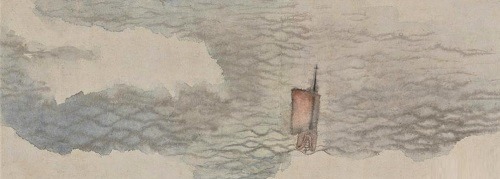
VIENDO LAS CIMAS DESDE EL RÍO
Del barco veo galopar las cimas, ciento en manada pasan en un guiño. Delante mudan como leño en torno; detrás varían como en desbandada. Vese una senda en alto cuarteando, con viandantes que van éter arriba. Por señas desde el barco quiero hablarles: vuela hacia el sur mi solitaria vela.
Su Shi
di-versión©ochoislas
*
江上看���
船上看山如走馬 倏忽過去數百群 前山槎牙忽變態 後嶺雜沓如驚奔 仰看微徑斜繚繞 上有行人高縹渺 舟中舉手欲與言 孤帆南去如飛鳥
蘇軾
#Su Shi#literatura china#poesía de Song#Su Dongpo#navegación#viaje#fugacidad#separación#di-versiones©ochoislas#蘇軾
2 notes
·
View notes
Text

su shi sushi
nom nom
#wangchuan fenghua lu#glorious records of wangchuan#elysium of legends#忘川风华录#忘川風華錄#<-traditional for lanca!#su shi#苏轼#蘇軾#su dongpo#苏东坡#蘇東坡#my art
4 notes
·
View notes
Text
He (Su) also wrote this absolute banger of a poem, which I often think back on in these benighted times:

[Image ID: this contains the text of the poem “On the Birth of a Son” by Su Dongpo, also transliterated as Su Tung-Po. The translator is Arthur Waley. The text reads: “Families when a child is born / Hope it will turn out intelligent. / I, through intelligence / Having wrecked my whole life, / Only hope that the baby will prove / Ignorant and stupid. / Then he'll be happy all his days / And grow into a cabinet minister.”]
You’ve probably seen that post floating around Tumblr a while ago:
my favorite thing i’ve learned in college is that way back in ancient china there was this poet/philosopher guy who wrote this whole pretentious poem about how enlightened he was that was like “the eight winds cannot move me” blahblahblah and he was really proud of it so he sent it to his friend who lived across the lake and then his friend sends it back and just writes “FART” (or the ancient Chinese equivalent) on it and he was SO MAD he travels across the lake to chew his friend out and when he gets there his friend says “wow. the eight winds cannot move you, but one fart sends you across the lake”
So I got curious, and I did some research, and apparently, the poet was Su Dongpo, also known as Su Shi (8 January 1037 – 24 August 1101), and he wasn’t just a poet - he was a writer, poet, painter, calligrapher, pharmacologist, gastronome, and a statesman of the Song dynasty.
That particular event happened while he was assigned to an official post at Guazhuo, and the “friend who lived across the lake” was actually Chan master Foyin, who was the master of a temple on the mountain on the opposite shore.
A translation of the poem Su Dongpo sent to master Foyin:
“Bowing with my highest respect To the deva of devas Whose fine light illuminates the whole universe, The eight winds cannot move me, For I am sitting upright on the golden purple lotus blossom.”
Foyin wrote “Pi” on the poem (”fart”, but also “nonsense”), and sent it back, and the rest is history.
17K notes
·
View notes
Text
honestly damn this level of analysis is kinda impressive. translation commentary bookmark
0 notes
Text

Su Dongpo, Poemas, 2023 https://pt.wikipedia.org/wiki/Su_Shi
1 note
·
View note
Text
Chapter 4 Reflection. AKA, How the Hell did I write this in 3 Days?
ff.net link
ao3 link
Last year, I published chapter 4 on the LOTR Fanatics Plaza in only 3 days after I published chapter 3. WTF. And this is one of those chapters where I didn't substantially revise later.
Spoilers ahead
What I remember about this chapter was a couple of things. The description of how Gao did those tricks with the football was largely inspired by how he did it in the 1998 Water Margin TV series.
There's something so... modern about how he became Grand Marshal. I wish this was the true story of his actual history: how he became buddies with the crown prince due to their passion for sports and that led him to become one of the most powerful people in the country.

Beware the power of.... the Football!
So Gao also gets his name Qiu in this chapter, and I wanted to make this a more memorable thing than its blink-and-you-miss-it moment in the book. His name, 俅, if you replace the left side (he) with king (王), you get "ball." Hence his nickname, Gao the Ball. Not really flattering since he got kicked in the balls in an earlier chapter.
Yanny (now known as Yanyi) then transforms into Gao Yannei. Pretty fun conversation to write between the two.
Gao then goes on his rampage against those who rejected him (his father for one) but I wanted to show his more compassionate side to people who supported him in the past, like Su Dongpo. Now I'm pretty sure he wasn't able to thank him directly in history, as I recall him helping out Su's family financially when Gao became powerful, implying Dongpo had passed already. Make him more than your typical one-dimensional corrupt person.
Then of course I end it with him realizing that this Wang Jin he looks forward to meeting is the person that beat the crap out of him.
That last line works in Mandarin Chinese. Since he would've said execute "ta." Ta can mean anyone and anything verbally since Mandarin dialect has only one gendered pronoun. And we'll see how Wang Jin takes advantage of that linguistic mishap.
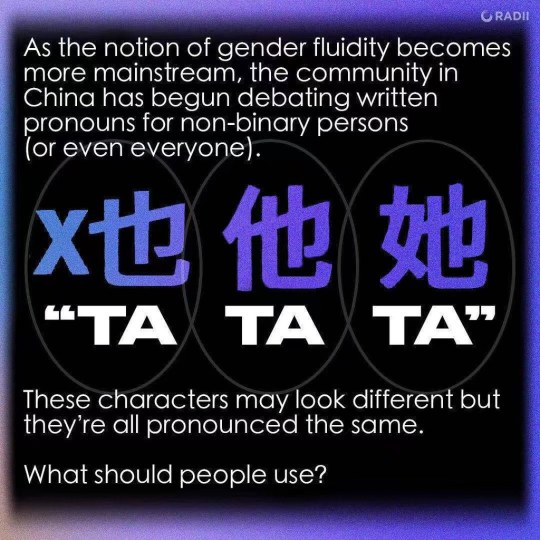
#lotrplaza#chapter reflection#reflections#wrote this chapter in three days#outlaws of the inland sea#water margin#fanfiction#crossover#linguistics#linguist humor#gao qiu#chinese history#su dongpo
0 notes
Text
There's a poem by famous Song Dynasty poet Su Shi (Su Dongpo) that is used in the Chinese HSR fandom to describe Jing Yuan. It's quite fascinating, the original poem is Su Shi lamenting the death of a famous painter, but the nature of classical Chinese is that the same line can be reinterpreted with minimal grammar shenanigans.
闻说神仙郭恕先,醉中狂笔势澜翻。 百年寥落何人在,只有华亭李景元。
[I] heard of the legendary figure Guo Shuxian, in a drunken state paintings emerged from his brush like crashing waves.
A century on who can compare? Only Li Jingyuan of Huating.
The reason the fandom latched onto this poem is that the last line can be easily reinterpreted because the historical artist Li Jingyuan's given name Jingyuan is the exact same characters as Jing Yuan. So a reinterpretation of this line could be:
Centuries of loneliness, who remains? Only the magnificent pagoda's plum tree and Jing Yuan.
The connection was, as far as I'm aware, first made in a video on Jing Yuan by bilibili user 七月Altair and has since found its way into various fanfics and fanart captions on lofter and other platforms.
59 notes
·
View notes
Text
Movie - I Come With The Rain
A psychologically disturbed ex-cop turned private detective Kline (Josh Hartnett) travels to Hong Kong in search of Shitao (Kimura Takuya), the only son of a powerful pharmaceutical conglomerate boss, who went missing in the Philippines while helping out in an orphanage. Kline finds a faint trail left by the ethereal Shitao, who was supposed to have been killed 7 months ago. The path leads to local gangster Su Dongpo (Lee Byung Hoon) who was also searching for Shitao, in hopes to find his beautiful, drug addicted girlfriend Lili (Fanny Lee).
**The movie is quite disturbing, definitely not for the faint of heart. But it has lots and lots of whump, all surrounding Kimura Takuya. I don't think there's any scene in the movie where he isn't covered in blood or in excruciating pain.**

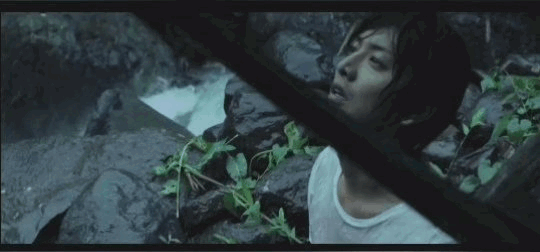

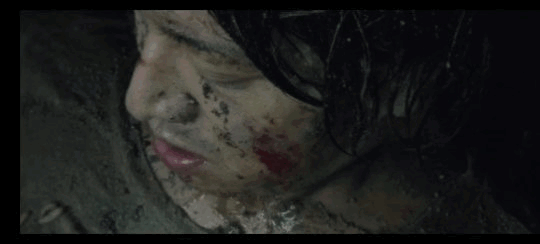
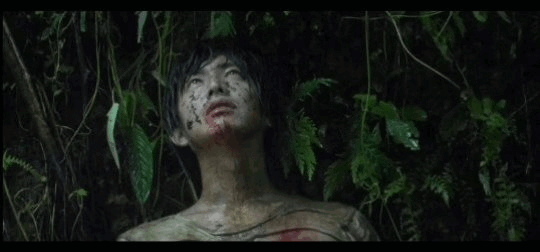


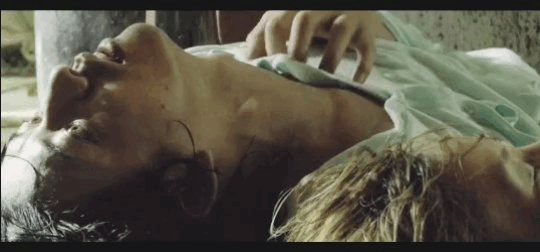

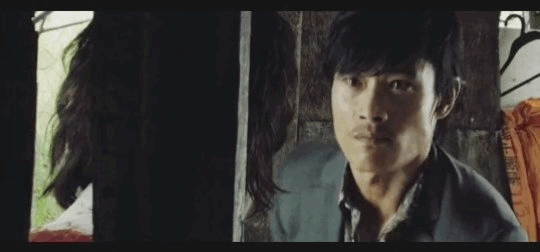
#whump#asian whump#jdrama#kdrama#kdrama whump#jdrama whump#takuya kimura#kimura takuya#lee byung hun#josh hartnett#i come with the rain#j movie#korean movie#fanny lee#drug abuse#drug withdrawal#scared#suffering#tw torture#ptsd#gift of taking others pain
24 notes
·
View notes
Text
The On1y One's ending is pre-empting you for a reunion, there is hope for the future
Can you believe, I sat down with my father for his advice on this. I must disclaim, I am an English-language user, but I know enough Mandarin to get by. Together with my father and Baidu, and after thinking about this for a few nights, my thoughts on that… the ending is hopeful – but bittersweet
The literature teacher starts off Episode 11 with the reciting of the poem 江城子 (Melody of a River Town) by Su Shi (otherwise, Su Dongpo) translations for this poem is taken from this site
十年生死兩茫茫。Ten years of separation by the immeasurable distance between life and death
不思量, 自難忘。 Is not something I'd like to think about, yet unforgettable it is already.
千里孤墳, A thousands miles away is your lonely grave,
無處話淒涼, I've nowhere to visit and my grief express.
縱使相逢應不識,Even if we could meet, we probably wouldn't each other recognise,
塵滿面,鬢如霜。For my faces has aged and my sideburns greyed as I have life's hardship sustained.

The teacher continues:
這就傳達了一種經過時間的滄桑 This expresses the inevitable change in the circumstances of life
再見面時 When we meet again
卻已幽冥兩隔的哀戚 We have already mourned our separation because of life and death
At this point, the teacher asks if the students understand. At my first watch, I’m going what the ever loving HECK (we were taught Mandarin for usage, not literature interpretation). My Mandarin is not even Taiwanese high school level, so I had to go study. Anyway!
The second part of the poem they do not go through in the show, is following,
夜來幽夢忽還。Last night out of the blue I dreamt of homecoming,
小軒窗,正梳妝。And there you were, putting on make-up after combing your hair.
相顧無言,Our eyes meet yet reticent we remained,
惟有淚千行。Yet rolling down our cheeks are tears forming far too many trails.
料得年年腸斷處,Then I realise we are where I'd visit year after year when my heart aches
明月夜,短松。On a night with a bright moon, on the hillock, among the pine saplings I'd stay.
Director Liu has indicated- instead of a 6 year separation according to the book (which I am TRYING to read; emphasis, trying), they have changed it to a ten year period. Su Shi wrote this poem 10 years after the death of his first wife, who died at the age of 17, exactly the age that the boys are now. It means the boys' separation, according to the poem, is inevitable. This pain, will be inevitable too, as Su Shi was known to be very affected by the loss of his first wife
Notice that the poem also states the night with a bright moon- this probably leads to the next part of the show, where Jiang Tian tells Sheng Wang that he chooses the moon.
But the teacher follows up with asking Jiang Tian to explain what the idiom 破鏡重圓 means. (Note: when I asked my Dad his interpretation of it, his first words, 'this idiom is not for just anybody getting back together, it is meant for husbands and wives, you know that, right?' and I swear I disassociated for a moment)


Jiang Tian notes well- it is the story of Le Chang, a princess from the dying Chen Dynasty. Seeing that the country is at war, her husband Xu Deyan tells her, as she is a great beauty, after the war is lost, they are bound to be separated as she will be given or taken as a spoil of war by the invaders. He tells her that if they both survive the war, there will be a chance that they can meet again. He breaks a bronze mirror and tells her on the fifth 元宵节 (fifteenth day of the first lunar month) after the loss of the war, to bring the mirror out and pretend to sell it- he will look for her amongst the vendors, so that they will have a chance to meet again.
After the war, Le Chang princess indeed is taken away and the lovers separated. Every year on the agreed date, Xu Deyan takes his half of the mirror and goes to sell it, and as he traverses the vendors, one year he finds a servant selling the other half, and it was then that he finds out that Le Chang is now a concubine of a ranking official of the new dynasty. In sadness, Xu Deyan writes a poem on it and gives his half to the servant.

Jiang Tian continues as the light gets brighter behind him, and his explanation is the content of the poem that Xu Deyan wrote to his wife in the half of his bronze mirror
可是這個美好故事的背後 But behind this beautiful story
卻有很深的意思 There is a deep meaning
在他們無法詳見的幾十年 In the decades that they were unable to meet
他們只能看著鏡子 They could only look at the mirror
思念當初美好的對方 And miss the other beautiful partner
團員後 Even after the reunion
在鏡中 In the Mirror
我再也看���到你當初嫦娥版的倩影 I can no longer see your Chang-Er like silhouette
只留下歲月映照後 Only leaving the impression left behind by the years
淒涼的月光 A desolate moonlight
GUYS, c’mon man I’m dying at this point. This mirrors the poem that Xu Deyan wrote to Le Chang on the mirror
鏡與人俱去,鏡歸人未歸。無復嫦娥影,空留明月輝
The mirror goes away with the person, but the mirror returns without the person. Chang'er's shadow is gone, the bright moon remains in the sky (this is from Google translate, don't come at me LOL, but you get the gist)
And perhaps they are saying now, that even reunited 10 years later, it will not be the same- you and I, will not be the same, and we will have this pain of separation be an impression on our lives in the future.
The story is psyching us up for the 10-year separation coming up ahead in the nerd-iest way and I’m still dying here please
And it’s JIANG TIAN that says this, in his glasses, and wearing his vest, the curtains of the room drawn leaving only 1 source of light behind him. He takes off his glasses at the end- two lenses signifying 2 halves of the mirror, perhaps???

The ending of the story is- the mirror is returned to Le Chang princess by her servant, and after receiving it, she goes into a turmoil so deep she doesn't eat or sleep or even wash. Her new husband, after hearing the news, allows her to return to Xu Deyan. Her new husband summons Xu Deyan to the residence and the lovers are reunited, at which he says 破鏡重圓 (literally- the broken mirror, has become whole again) - could this be a hint that any opposition to their relationship will finally be relented after a forced separation?
Of course in the later ensuring conversation, Jiang Tian expresses that he chooses the moon (ie, Sheng Wang)


Perhaps like Xu Deyan, he has already made up his mind, or prepared for the inevitable separation. I will wait for you, and not only that, I will find a way that we will be back together again.


At the end of Episode 12, another Su Shi poem appears (translations from here

山頭斜照卻相迎 The setting sun (slanting) over the mountain offers greetings still
回首向來蕭瑟處 Looking back over the bleak passage survived
歸去The return in time
也無風雨也無晴 Shall not be affected by windswept rain or shine

THE RETURN IN TIME SHALL NOT BE AFFECTED BY WINDSWEPT RAIN OR SHINE and it’s RAINING OUTSIDE THE CLASSROOM (lying on the ground in a puddle, POETRY)
I’m also going to link the Baidu article for this poem (if you wish to translate it for a read), but basically, the poem expresses the author returning after a drinking session when it starts to rain, and when everyone is rushing to return and to look for shelter, he takes his time going back. The teacher continues with the explanation of this -
這些日子他被流放到外地 In the days where he was in exile
寫下抒發自己內心的文字 he wrote down the feelings he had in his heart
他表示他不會害怕 He expressed that he would not be afraid
他會勇往直前 He will forge bravely ahead
且不會畏懼 and without fear
他也很期待 He also looks forward
回去的日子to the day he will return

And here, they focus on Jiang Tian tying the broken bracelet back and pronouncing that he will wait for Sheng Wang’s return.
The rain outside the window is the beginning of the separation! The bleak passage survived from the poem!
To match this poem, the POV changes to Sheng Wang

暗戀是一個人的兵荒馬亂 To be secretly in love with someone is a turmoil (the idiom 兵荒馬亂 literally translates to soldiers in a panic and horses in a mess – the war/fortress analogy is BACKKK)
因為太喜歡你 Because I like you so much
所以我如臨深淵 如履薄冰 I feel like I am facing a deep abyss, like walking on thin ice (the pure linguistic poetry of this line, it kills me)
以至於差點忘了 to the point I almost forgot
我17歲了I’m 17
這個年紀裡 整個世界都是我的 At this age, the world is my oyster
不需要猶豫 No need for hesitation
也用不著權衡 And I don’t have to compromise
我無堅不摧 I’m indestructible
也無所不能 And there’s nothing I can’t do

And the entire dialogue ends with Jiang Tian's voice asking Sheng Wang, Can you try to pass the test and return?
And Sheng Wang says Yes
Is it the test for returning to Class A, or is it the test of the NEXT TEN YEARS?
#the on1y one#某某#i will never stop nerding about this#the nuance and the preparation for season 2#i truly hope it happens!
31 notes
·
View notes
Note
Mind if I throw you a curve ball? I’m looking for Chinese writers/poets who were influential on Premodern Japanese literature besides Bai Juyi (aka Bo Juyi, Po Chü-i, Bai Letian, Po Letien, Haku Rakuten, etc.). Tang dynasty poets are pretty awesome but I need to branch out.
Here are a few that we came up with:
Zhuangzi (莊子, Sōshi): Zhuangzi, a Daoist philosopher and writer, influenced Japanese literature through the spread of Daoist and Zen Buddhist thought. His ideas about spontaneity and the unity of all things had an impact on Japanese poets and philosophers.
Tao Yuanming (陶淵明, Tōenmei): Tao Yuanming, a poet of the Eastern Jin Dynasty, was known for his pastoral poetry and themes of rural life. His influence can be seen in Japanese literature, particularly in works that celebrated the beauty of the countryside.
Su Dongpo (蘇東坡, So Tōhaku): Su Dongpo, also known as Su Shi, was a versatile Song Dynasty writer who excelled in poetry, prose, and calligraphy. His philosophical and literary works had an impact on Japanese literature, especially in the fields of poetry and essay writing.
Hopefully this helps!
142 notes
·
View notes
Text

VIGÉSIMO SÉPTIMO DÍA DEL SEXTO MES, EBRIO EN LA TORRE VIGÍA DEL LAGO, CINCO POEMAS
I
Tinta de negras nubes cubre casi el alcor; perlas de blanca lluvia brincan dentro del bote. Una súbita ráfaga rolando las dispersa: luce bajo la torre raso de aguas y cielo.
II
Los peces y tortugas siguen libres la gente; lotos sin dueño a cientos florecen por doquier. Cabezal sobre el agua, se te inclinan las lomas; la barca suelta al viento divaga tras la luna.
Su Shi
di-versión©ochoislas
*
六月二十七日望湖樓醉書五絶
黑雲飜墨未遮山 白雨跳珠亂入船 捲地風來忽吹散 望湖樓下水如天
放生魚鱉逐人來 無主荷花到處開 水枕能令山俯仰 風船解與月徘徊
蘇軾
#Su Shi#literatura china#poesía de Song#Su Dongpo#Hangzhou#contemplación#divagación#claridad#libertad#otear#di-versiones©ochoislas#蘇軾
1 note
·
View note
Text
now that the monkey king post is winding down in my notes i wanna say it is the cutest shit ever that so many people in the notes of that post were like "omg a journey to the west reference??? i love that so much!!!" i loved seeing it and it is entirely indicative of how we should all forget about the latest new media and read a whole bunch of already existing stories like the epic of gilgamesh the mahabharata the tain bo cualinge etc
but it's also so reflective of how curated my own feed and circle of mutuals is (esp because theyre all smart and curated as well) because i'll see a random guy go "of course you know about su dongpo the chinese poet who wrote about how he is unfettered by the eight winds and yet when his master wrote back 'fart' he had rushed to him only to be told 'so the eight winds cant move you but a fart blows you across the lake?' " and ill be like yeah dude who doesnt know about him
34 notes
·
View notes